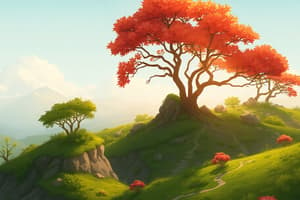Podcast
Questions and Answers
Which of the following plants is classified as having scented leaves?
Which of the following plants is classified as having scented leaves?
- Eucalyptus globules
- Rosa damascena
- Cymbopogon sps (correct)
- Cinnamomum camphora
Which aromatic oil is categorized as a floral oil?
Which aromatic oil is categorized as a floral oil?
- Lavandula angustifolia
- Ginger oil
- Cedar wood oil
- Jasmine oil (correct)
Which of these classifications involves plants with aromatic wood?
Which of these classifications involves plants with aromatic wood?
- Cinnamomum sp. (correct)
- Eucalyptus citriodora
- Jasminum sps
- Matricularia chamomilla
What type of oil is extracted from Lavandula angustifolia?
What type of oil is extracted from Lavandula angustifolia?
Which plant has scented flowers according to the classification?
Which plant has scented flowers according to the classification?
What category does Cymbopogon spp. belong to?
What category does Cymbopogon spp. belong to?
Which of these options is specifically classified as having aromatic bark?
Which of these options is specifically classified as having aromatic bark?
Which of the following is NOT classified under plants with aromatic gums?
Which of the following is NOT classified under plants with aromatic gums?
Which type of forest is classified as subtropical evergreen forest on the basis of climatic conditions?
Which type of forest is classified as subtropical evergreen forest on the basis of climatic conditions?
Which classification of vegetation pertains to the areas surrounding the Karnali River?
Which classification of vegetation pertains to the areas surrounding the Karnali River?
What percentage of land in Nepal is classified as belonging to the Plane region?
What percentage of land in Nepal is classified as belonging to the Plane region?
What is the main focus of phytogeography as described in the content?
What is the main focus of phytogeography as described in the content?
In terms of vegetation composition and ecology, which region is identified as Terai?
In terms of vegetation composition and ecology, which region is identified as Terai?
Which type of vegetation is classified under Arid zones based on moist habitats?
Which type of vegetation is classified under Arid zones based on moist habitats?
What classification corresponds to the area on the southern sides of the Himalayas?
What classification corresponds to the area on the southern sides of the Himalayas?
Which group of plants comprises the largest number of species available in Nepal?
Which group of plants comprises the largest number of species available in Nepal?
Which of the following categories does HPPCL use to classify medicinal plants based on where they are found?
Which of the following categories does HPPCL use to classify medicinal plants based on where they are found?
Which type of medicinal plant is characterized by having roots with medicinal properties according to HPPCL?
Which type of medicinal plant is characterized by having roots with medicinal properties according to HPPCL?
Which of the following is classified by HPPCL as having leaves with medicinal properties?
Which of the following is classified by HPPCL as having leaves with medicinal properties?
In HPPCL's classification, which medicinal plant is listed under the 'Seeds and Fruits' category found in the Mountain region?
In HPPCL's classification, which medicinal plant is listed under the 'Seeds and Fruits' category found in the Mountain region?
Which type of plant does HPPCL classify as having whole plant medicinal properties?
Which type of plant does HPPCL classify as having whole plant medicinal properties?
Which of the following is linked with having a medicinal bark according to HPPCL's classification?
Which of the following is linked with having a medicinal bark according to HPPCL's classification?
According to HPPCL, which plant is classified for its medicinal flower and floss?
According to HPPCL, which plant is classified for its medicinal flower and floss?
Which of the following types of plants does HPPCL classify under the 'Gum/Resin' category?
Which of the following types of plants does HPPCL classify under the 'Gum/Resin' category?
Flashcards
Phytogeography
Phytogeography
The study of how plants are distributed across the globe and the factors that influence their distribution, including environmental conditions.
Phytogeography of Nepal
Phytogeography of Nepal
The study of plant distribution within a specific region, like Nepal, focusing on the factors that influence their growth and arrangement.
Classification of Phytogeography of Nepal (Climate)
Classification of Phytogeography of Nepal (Climate)
A categorization of Nepal's plant life based on climate. Includes zones like subtropical, deciduous, coniferous, alpine, and tundra.
Classification of Phytogeography of Nepal (Rivers)
Classification of Phytogeography of Nepal (Rivers)
Signup and view all the flashcards
Classification of Phytogeography of Nepal (Moisture)
Classification of Phytogeography of Nepal (Moisture)
Signup and view all the flashcards
Classification of Phytogeography of Nepal (Vegetation)
Classification of Phytogeography of Nepal (Vegetation)
Signup and view all the flashcards
Systematic medical treatment
Systematic medical treatment
Signup and view all the flashcards
Transfer from generation to generation by means of written documents
Transfer from generation to generation by means of written documents
Signup and view all the flashcards
Alphabetical classification of medicinal plants
Alphabetical classification of medicinal plants
Signup and view all the flashcards
Taxonomic classification of medicinal plants
Taxonomic classification of medicinal plants
Signup and view all the flashcards
Morphological classification of medicinal plants
Morphological classification of medicinal plants
Signup and view all the flashcards
Chemical or Pharmacological Classification
Chemical or Pharmacological Classification
Signup and view all the flashcards
Biogenetic Classification
Biogenetic Classification
Signup and view all the flashcards
Therapeutic or Pharmacological Classification
Therapeutic or Pharmacological Classification
Signup and view all the flashcards
Ayurveda Medicine
Ayurveda Medicine
Signup and view all the flashcards
Chinese Medicine
Chinese Medicine
Signup and view all the flashcards
Medicinal Plants & Essential Oils
Medicinal Plants & Essential Oils
Signup and view all the flashcards
Classification by Therapeutic Systems
Classification by Therapeutic Systems
Signup and view all the flashcards
Classification by Botanical Families
Classification by Botanical Families
Signup and view all the flashcards
Classification by Scent
Classification by Scent
Signup and view all the flashcards
Scent Profiles
Scent Profiles
Signup and view all the flashcards
Classification by Scented Part
Classification by Scented Part
Signup and view all the flashcards
Aromatic Plants with Scented Leaves
Aromatic Plants with Scented Leaves
Signup and view all the flashcards
Aromatic Plants with Scented Twigs and Leaves
Aromatic Plants with Scented Twigs and Leaves
Signup and view all the flashcards
Study Notes
Classification of MAPS
- Phytogeography correlates plants and environment
- Phytogeography aims to record and explain global plant distributions
Phytogeography of Nepal
- Nepal's land distribution (percentage):
- Forest: 44.74%
- Grassland: 12%
- Shrubland: 10.6%
- Agricultural land: 21%
- Barren land: 7%
- Major regions:
- Himalayan region
- Mahabharat & Hilly region
- Plane region
Plant Species in Nepal
- Total plant species: 5160
- Pteridophytes: 385
- Gymnosperms: 25
- Angiosperms: 4750
- Medicinal plants: 1000 spp
- Aromatic plants: 250 spp
Classification of Phytogeography in Nepal (Based on various factors)
- Climatic conditions:
- Subtropical evergreen forest
- Deciduous monsoon forest
- Evergreen coniferous forest
- Alpine grasslands
- Tundra vegetation
- River distribution:
- Karnali vegetation
- Gandaki vegetation
- Koshi vegetation
- Moist Habitats:
- Terai and Bhabar
- Foot hills
- Mahabharat range
- Mid lands
- Himalayas
- Inner Himalayas
- Arid Zones
- Vegetation Composition and Ecology:
- Terai, Bhabar, Dun valleys, and foot hills
- Midland area and southern sides of the Himalayas
- Chure
- Mahabharat ranges
- Humla-Jumla area (north-west)
- Dry river valleys
- Arid zones
Classification of MAPS (Motoyoshi Satake 2000)
- Systematic Medical Treatment: Transferring knowledge through written documents
- Egyptian, Mesopotamian civilizations leading to Western and Arabian medicine
- Greek and Roman civilizations
- Indus civilization leading to Ayurveda Medicine
- Yellow river civilizations leading to Chinese medicine and Kampo medicine
- Non-Systematic Medical Treatment: Most medicinal plants aren't documented
- Most medical knowledge isn't written down
Classification of Medicinal Plants
- A: Alphabetical
- B: Taxonomic
- C: Morphological
- D: Pharmacological or therapeutic
- E: Chemical or Biogenetic
HPPCL Classification of Medicinal Plants (Mountain/Terai)
- Divides plants based on their region (mountain or Terai) and plant part
- Herbal plants with medicinal properties, rooted, leaves, seeds & fruits, whole plant, Bark, Flower & Floss, Dying, Gum/Resin
- Essential oil bearing medicinal plants
- Other categories
Classification on Basis of Therapeutic Systems
- Ayurvedic (Origin: India; 7000 plants used)
- Allopathic (Origin: Greek, U.K.; 30-40 plants used)
- Homeopathic (Origin: Germany; 450 plants used)
- Tibetan (Origin: Tibet, China; 4000 plants used)
- Unani (Origin: Greece, Unan; 700 plants used)
- Siddha system (Origin: Western Asia or India; 600 plants used)
Classification on the Basis of Angiospermic Families
- Dicotyledonous Families
- Monocotyledonous Families
Classification on the Basis of Odour or Perfume
- Lists various plants and their characteristic oils based on scents
- Winter Green oil (Gaultheria procumbens)
- Otto of rose oil (Rose)
- Citrus oil
- Floral oils
- Spicy oils
- Chyper oil
- Fougere oil
- Woody oil
- Almond oil
- Citronella oil
- Chamomile oil
- Ylang-Ylang oil
- Eucalyptus oil
Classification of Aromatic Plants Based on Scented Plant Parts
- Categorizes aromatic plants by scented parts
- Plants with scented leaves
- Plants with scented young twigs, flowering tops, needles
- Plants with scented flowers
- Plants with aromatic wood
- Plants with aromatic bark
- Plants with scented gums
Studying That Suits You
Use AI to generate personalized quizzes and flashcards to suit your learning preferences.



